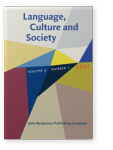Vol. 3:1 (2021) ► pp.9–33
Okra in translation
Asylum seekers, food, and integration
This article explores the theme of food translation, based on research conducted in Italy in 2018 with a group of asylum seekers from different West African countries. It concentrates on a community gardening project revolving around the cultivation of okra: a vegetable that is a staple in many African cuisines, but not very popular in Italy, which provided the occasion for the participants to communicate their home foodways.
As something that is linked to the most basic human needs, and yet bears high cultural significance, food can be used as a lens to explore the shifting relationship between language and other embodied forms of meaning. Translating food means engaging with a complex interplay of language, sensory experiences, and socio-cultural norms. Drawing from recent semiotically-oriented developments in translation studies as well as applied linguistics, and the semiotics of food, I analyze key participants’ involvement with the project.
Article outline
- 1.Introduction
- 2.Translation and refugee integration
- 3.Translating food
- 4.Context and methodology
- 4.1The Italian refugee hospitality program
- 4.2Context for this study
- 4.3Research methodology and rationale
- 4.4A note on okra in Italy
- 5.In the field
- 6.In the market
- 7.Conclusions
- Acknowledgements
- Notes
-
Bibliography
For any use beyond this license, please contact the publisher at [email protected].
